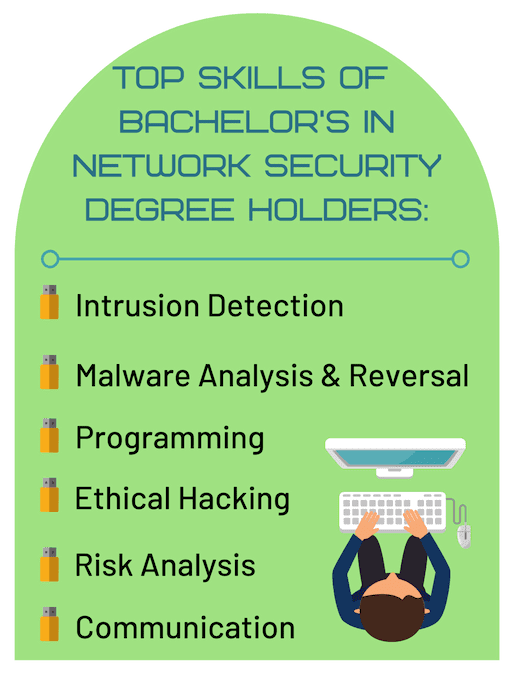Network specialists are indispensable in a society that is dependent on technology and automation. Taking a course in Cybersecurity or Network Security will help you understand networks, tools, devices, and information technology in preventing future online threats.
You get to learn more about network systems, cyber terrorism schemes, and technical issues that come with online attacks.
The work that Network Security experts do combats the soaring country’s soaring incidents of data breaches which, as of 2018, has reached the 4.5 billion data breach index. There are 2.2 billion cases of breached data in the Social Media sector alone.
And while there are efforts to double their efforts to ensure network security, hackers seem to be just as up-to-date in breaching security measures. The recent WhatsApp loophole is proof positive of how hackers can easily break into anyone’s digital device, steal pertinent data, and use it for personal gain.
Advanced phishing schemes and automation vulnerabilities keep not only government authorities on their toes but also companies and organizations of all types and sizes. This means that, while technology is making our lives more convenient, the world has become more susceptible to digital crimes.
If you want to become a network security specialist to land a fulfilling and indispensable job, the first step to take is to earn a degree in the field.
If the traditional college class doesn’t suit your lifestyle or disrupts your work schedule, find accredited schools with online programs. Online learning is also ideal for part-time students, veterans, military personnel, working individuals, and distance learners.
METHODOLOGY
In coming up with the Best Online Schools for Bachelor’s in Network Security, we took into account the hallmarks of the best online academic institutions in the United States. This profiled list highlights the top features of the online programs that ensure the finest quality of online education that produces outstanding distance learners.

- Each of the online schools on this list presents students with rigorous program coursework that rivals traditional classroom instruction.
- An important factor is the virtual learning platform that is accessible and offers online support.
- When available, we mention the online program’s stringent requirements for admission and graduation.
- Credit transfer programs and accelerated degree completion options, if any, are emphasized.
- All online schools on this list are duly accredited and recognized by accrediting agencies to prove their adherence to high academic standards.
- Most of the online Network Security programs on this list are offered by online schools in collaboration with government agencies and private organizations that employ highly trained network security professionals.
For a deeper understanding, please see our Methodology page.
Best Online Schools for Bachelor’s in Network Security

Western Governors University (WGU)

Online BS in Cybersecurity and Information Assurance
Offered through WGU Online, the Bachelor of Science in Cybersecurity and Information Assurance is a program dedicated to students who want to pursue a professional career in the IT industry. This degree program embraces the training and educational standards that qualify its graduates for employment at the Department of Homeland Security (DHS) and the National Security Agency (NSA).
The courses are recognized by top agencies in the network security field, including CompTIA and EC-Council. Accelerated and full-time students may earn this degree in one to two years.
Learn more about WGU Online’s Bachelor of Science in Cybersecurity & Information degree program.
University of Illinois Springfield

Online Bachelor in Information Systems Security
The Bachelor’s degree in Information Systems Security offered at the University of Illinois Springfield imparts basic computer science theories, network security, and IT systems. The UIS Computer Science Department serves as an instruction center of the Cisco Regional Networking Academy.
This program is suitable for students with prior experience in Java programming looking to enhance their knowledge of network security.
Learn more about UIS’ online Bachelor in Information Systems Security program.
Kennesaw State University

Online BS in Cybersecurity
Online (BBA) Bachelor in Business Administration – Information Security & Assurance
You have two options if you’re considering a network security course at KSU: Bachelor of Science in Cybersecurity or Bachelor of Business Administration in Information Security and Assurance (BBA-ISA).
The undergraduate degree in Cybersecurity focuses on the technical aspects of network security and develops skills for managing and protecting data information. BBA-ISA students explore the concepts of network security and its impact on business.
Learn more about KSU’s online Bachelor of Science in Cybersecurity and BBA-ISA programs.
Purdue University Global

Online BS in Cybersecurity
The Bachelor of Science in Cybersecurity is a 180-credit program recognized by the Department of Defense in helping students learn more about network security.
Courses are specifically tailored for students planning to take on career paths in the IT and Network security industry for major companies and the government. You also have the option to take an internship to help you put into practice what you learned in real-world situations.
Learn more about Purdue’s online Bachelor of Science in Cybersecurity program.
Colorado State University-Global Campus

Online Bachelor’s in Information Technology
Online Bachelor in Management Information Systems & Business Analytics
There are two options to choose from if you’re planning to take a network security degree. The Bachelor’s degree in Information Technology is packed with courses to help you get started toward earning highly recognized certifications such as CompTIA Security+ and Microsoft SQL. There are two specializations under this course to choose from:
- Cybersecurity & Intelligence
- Homeland Security
The Bachelor’s degree in Management Information Systems and Business Analytics aims to help students learn about business and its effect on technology as well as understand market directions and trends. This course is suitable for students who want to pursue managerial or financial aspects of network security.
Learn more about CSU-Global’s online Bachelor’s degrees in Information Technology and Management Information Systems and Business Analytics programs.
Dakota State University (DSU)

Online BS in Network and Security Administration
DSU Online offers a Bachelor of Science in Network and Security Administration for students interested in pursuing a professional career specifically in systems security. Students will learn the technical aspects of the latest security strategies and other enterprise-level hardware configurations.
Other aspects of this program include defensive hacking and network forensics. Students may also have the opportunity to participate in research activities and work with professors or other institutions.
Learn more about DSU Online’s Bachelor of Science in Network and Security Administration program.
Drexel University Online

Online BS in Computing and Security Technology
The online Bachelor of Science in Computing and Security Technology is intended for students with prior learning or work experience in the field of network security or programming. This degree will help students enhance their knowledge and skills in IT security.
Students can choose from Computing or Security Technology they can accomplish at their own pace. Credit transfers and military education benefits are available for eligible participants who want to get access to an accelerated program.
Learn more about Drexel University Online’s Bachelor of Science in Computing and Security Technology program.
Penn State World Campus

Online BS in Security and Risk Analysis
The Bachelor of Science in Security and Risk Analysis focuses on educating and equipping future network security specialists in protecting data and other tech assets against hacking.
This is a 120-credit program touching topics on information technology, data organization, laws and regulations governing standard IT practices, and the threat of terrorism and crime to name a few. It is recognized by the Center of Academic Excellence in Cyber Defense.
Learn more about Penn State World Campus’ online Bachelor of Science in Security and Risk Analysis program.
Liberty University

Online BS in Information Technology-Data Security and Security
The Bachelor of Science in Information Technology-Data Security and Security is a 120-credit program intended for distance learners looking to get into a professional career in network security.
Embedded with Christian principles, this coursework will help students develop skills and knowledge in effectively converging design technology, engineering applications, and the use of innovative tools and technology to get the desired business outcomes.
The Information Security Planning class prepares students to create and implement security programs into certain systems while the Cyber-Security course dwells into details of the Official (ISC) 2 SSCP Certified Body of Knowledge and System Security Certified Practitioner Certification (BMIS 342).
Learn more about Liberty University’s online Bachelor of Science in Information Technology-Data Security and Security program.
Capitol Technology University

Online BS in Cybersecurity
Intended for students looking to complete their degree online in this niche, the Bachelor of Science in Cybersecurity may provide the expertise you’ll need when you go into the world of network security.
Offered as one of the three online undergraduate courses, this program prepares students for essential exams such as CompTIA Security+ and industry certifications including Network+, A+, and Certified Ethical Hacker.
Students may also participate in Cybersecurity Challenges held regularly for qualified participants to hone their skills by competing against other schools. This 120-credit program covers topics on mathematics, social science, programming, information assurance, computers, and sciences.
Learn more about Capitol Technology University’s online Bachelor of Science in Cybersecurity program.
George Mason University

Online Bachelor of Applied Science in Cyber Security
The Bachelor of Applied Science in Cyber Security is a specialized program in network security. Students who earned an Associate of Applied Science in Cybersecurity from Northern Virginia Community College (NOVA), Tidewater Community College (TCC), or Lord Fairfax Community College (LFCC) may earn their full degree through George Mason University online.
Graduates of this degree are recognized by the National Initiative for Cyber Security Education (NIS), a prerequisite for network security specialists.
Learn more about George Mason University’s Bachelor of Applied Science in Cyber Security program.
Syracuse University

Online Bachelor of Professional Studies in Cybersecurity Administration
As part of this institution’s list of online programs, the Bachelor of Professional Studies in Cybersecurity Administration is a 120-credit degree focused on information system infrastructures and securing data against hacking. The program’s curriculum includes:
- liberal studies,
- ethical and critical thinking,
- communication,
- and relationship management.
Some of the core courses are safeguarding knowledge management and codification data and leading issues in information security for professional studies. Eligible students may apply for scholarships, grants, and FAFSA for their financial needs.
Learn more about Syracuse University’s online Bachelor of Professional Studies in Cybersecurity Administration program.
Charter Oak State College

Online Bachelor in Cybersecurity
Intended for students with a computer-related background, the Bachelor’s Degree in Cybersecurity helps you enhance your knowledge and skills against hacking and data breaches. You will learn technical and fundamental aspects of network setting, and risk management, and apply policies and regulations to maintain the safety of the system and information.
This is a 45-credit degree to help you become a professional Network Security specialist in your chosen industry. Eligible students will be evaluated for credit transfers from previous certifications and/or degrees earned. Military personnel with programming or computer science backgrounds may consider this program as an added credential in their portfolio.
Learn more about Charter Oak State College’s online Bachelor in Cybersecurity program.
Bellevue University

Online BS in Cybersecurity
Combining computer science with forensics, the Bachelor of Science in Cybersecurity is an ideal program for students who want to know more about network settings and the prevention of cyber hacking. It is packed with topics on technical aspects of network security such as operational security, data, and database security, security for healthcare, and structured system analysis and design.
https://www.youtube.com/watch?v=sJNcGPOsGnE
This 127-credit degree may also be taken as a cohort for students looking for a blend of the traditional classroom setting with online classes.
Learn more about Bellevue University’s online Bachelor of Science in Cybersecurity program.
University of Arizona (UA)

Online Bachelor of Applied Science in Cyber Operations
The Bachelor of Applied Science in Cyber Operations from UA Online is considered one of many accredited institutions to teach Cybersecurity by the National Security Agency (NSA). Students with prior credits (minimum of 60 credits) from accredited institutions may opt to get their full bachelor’s degree in UA. Students can choose from two concentrations: Engineering and Defense and Forensics.
Graduates of this program may land an opportunity to work in government agencies such as the NSA.
Learn more about UA Online’s Bachelor of Applied Science in Cyber Operations program.
King University

Online BS in Information Technology-Cybersecurity
The Bachelor of Science in Information Technology with a track in Cybersecurity is a suitable program to prepare for future jobs in project management, research, IT plan development, and policy consultation.
Students who will be taking this 124-semester hour coursework will need at least 45-semester hour credit to be eligible for enrollment. If you have prior learning credits from a computer or programming course, this curriculum may help you land better professional careers in the IT industry. Military education benefits and financial aid are also available for eligible students.
Learn more about King University’s online Bachelor of Science in Information Technology-Cybersecurity program.
Old Dominion University

Online BS in Cybersecurity
If you’re looking to earn a higher credential for your network security skills, then taking the Bachelor of Science in Cybersecurity at ODU might be the right choice. From your previous learning experience, you will be able to learn in-depth details about security networks and protecting online data
This is ideal for students with criminal justice, philosophy, engineering management, computer science, information technology, modeling and simulation engineering, and computer engineering backgrounds. It is a predominantly technical program hence ideal for students excelling in math and analytical traits.
Learn more about ODU’s online Bachelor of Science in Cybersecurity program.
Southern Illinois University

Online BS in Information Technology & Information Systems
The Bachelor of Science in Information Technology and Information Systems (IST) with a focus on Network and Information Security is a 120-credit hour program packed with courses on Cybersecurity specialization, the Internet of Things (IoT), Data Management, Network and System Administration, Applied Data Analytics, IT/IS Management, and Web and Mobile App Development.
For participants who live in nearby states, you may also get the opportunity to get an internship from their IST program.
Learn more about Southern Illinois University’s online IT program.
University of Maryland Global Campus

Online Bachelor in Cybersecurity Management and Policy
Online Bachelor in Computer Networks and Cybersecurity
Online Bachelor in Software Development and Security
Students have the option to choose from one of the three types covering network security:
- Bachelor’s Degree in Cybersecurity Management and Policy,
- Bachelor’s Degree in Computer Networks and Cybersecurity,
- and Bachelor’s Degree in Software Development and Security.
These programs cover in-depth topics on digital forensics and tech policies. Students may also be eligible to work with Maryland’s cyber security network from military installations to private research centers.
Learn more about the University of Maryland Global Campus’ online Bachelor’s degrees in Cybersecurity Management and Policy, Computer Networks and Cybersecurity, and Software Development and Security programs.
Excelsior College

Online BS in Cybersecurity
The online Bachelor of Science in Cybersecurity develops analytical thinking while providing technical skills and knowledge revolving around network and data security. As part of your preparation for a professional career in network security, this 120-credit program covers essential topics such as:
- computer forensics,
- governance and compliance,
- network and application security,
- and microprocessors or computer systems architecture to name a few.
Students with prior work experience or education may be eligible for credit transfers of up to 117 credits.
Learn more about Excelsior College’s online Bachelor of Science in Cybersecurity program.
Saint Leo University

Online BS in Cybersecurity
Online BS in Computer Science-Information Assurance
Students planning to take Network Security degrees may choose from two options: Bachelor of Science in Cybersecurity and Bachelor of Science in Computer Science – Information Assurance. With a Cybersecurity focus, you’ll get in-depth education including:
- penetration testing,
- computer forensics,
- disaster recovery,
- Internet/intranet security,
- and homeland defense.
For the Information Assurance focus, you’ll learn more about programming logic and design, database concepts and programming, computer systems, and network defense and security.
Nearby students looking into internships may find opportunities in Tech Data Corporation, Verizon, and Pasco County Sheriff’s Department if you’re enrolled in this program.
Learn more about Saint Leo University’s online Bachelor of Science in Cybersecurity and Computer Science-Information Assurance programs.
Norwich University

Online BS in Cybersecurity
The Bachelor of Science in Cybersecurity will help you thread the global landscape, develop essential skills, and use efficient tools to battle today’s technology threats. Norwich University offers two concentrations students can choose from:
- Computer Forensics and Vulnerability Management
- Information Warfare and Security Management
Students with prior learning credits can transfer up to 90 semester credits (depending on eligibility) to get into the accelerated program. Full-time students taking the accelerated program may also earn their Cybersecurity degree within two years. Financial aid and military education benefits are also available for qualified individuals.
Learn more about Norwich University’s online Bachelor of Science in Cybersecurity program.
Champlain College

Online BS in Cybersecurity
The Bachelor of Science in Cybersecurity focuses on protecting digital assets and security breaches with its up-to-date curriculums on cyber hacking. This program is given in an accelerated 7-week format so adult learners can earn their degree faster. It focuses on courses in:
- operating systems,
- senior seminar project,
- digital forensic investigation techniques,
- security scripting with Python,
- and ethical hacking.
Throughout the program, you can earn certifications such as System Administration, Computer Forensics and Digital Investigations, Linux Administration, and Computer Networking so you won’t have to take them separately after earning your degree.
Learn more about Champlain College’s online Bachelor of Science in Cybersecurity program.
Franklin University

Online BS in Cybersecurity
The Bachelor of Science in Cybersecurity is a credit transfer-friendly program for students with prior learning credits from their programming or computer science degree. You will learn more about security architecture, countermeasures against hacking, and essential topics covered by the International Information Systems Security Certification Consortium (ISC) ².
The tuition fee is pegged at $670 per credit with service members paying only $536 per credit.
Learn more about Franklin University’s online Bachelor of Science in Cybersecurity program.
Wilmington University

Online BS in Computer and Network Security
Students interested in network security can look into the Bachelor of Science in Computer and Network Security (CNS). This program provides a broad framework for participants who would like to specialize in digital forensics.
You may also like to take the opportunity to enhance your credentials by taking the Accelerated Option for SCADA Cybersecurity Graduate Certificate. If you have prior credits from an associate’s degree, college credits, or certifications, you can opt to have it transferred to get into an accelerated program.
Learn more about Wilmington University’s online CNS program.
Utica College

Online BS in Cybersecurity
Equipped with advanced approaches in technology and data management, the Bachelor of Science in Cybersecurity is integrated with the goals of the Center of Identity Management and Information Protection. This degree’s curriculum includes:
- intrusion investigations,
- fraud investigations,
- information assurance,
- and cyber operations.
Intended for students with prior learning credits and/or experience, this program will help you enhance your knowledge and skills and earn that professional degree as a Network Security specialist.
Learn more about Utica College’s online Bachelor of Science in Cybersecurity program.
Misericordia University

Online BS in Information Technology-IT Security
The Bachelor of Science in Information Technology with IT Security specialization emphasizes these core topics:
- introduction,
- current issues and trends in IT security,
- IT privacy and legalities,
- security/risk assessment and management,
- disaster recovery,
- access controls,
- models,
- and cryptography.
This is a 121-credit program that can be earned in two to four years as a full-time student. It’s a technical course, so this is ideal for students who are keen on handling mathematics, programming, research, and critical thinking.
Learn more about Misericordia University’s online Bachelor of Science in Information Technology – IT Security program.
Davenport University

Online BS in Cyber Defense
The Bachelor of Science in Cyber Defense is a 120-credit program intended for students looking to establish a career in network security. You can choose one from two specialties:
- Health Care Information & Assurance
- Information Security
Healthcare assurance focuses on laws, regulations, and data governance while Information Security dwells more on data authentication, audits, and troubleshooting network systems. Should you pursue a technical aspect of network security, taking a minor in Mathematics may help boost your credibility in your resume.
Davenport University also offers accredited certifications related to network security and programming to further enhance your skills portfolio.
Learn more about Davenport University’s online Bachelor of Science in Cyber Defense program.
Frequently Asked Questions

What will I get from my Bachelor’s Degree in Network Security?
A typical Network Security program will have 120-credit hour coursework where students usually graduate from this degree within 2 to 4 years. However, accelerated programs can shorten that to 1 to 3 years.
Students with prior learning experience can ask their school administrators if an accelerated learning program is available. Consider that if you’re taking this as a part-time student, there’s a higher chance that it will take you longer to graduate from this program.
The average tuition for a Network Security program is roughly around $8,000 to $25,000 per year. While the fee might feel a bit ‘hefty,’ it is worth looking into the value of the education and job outlook for tech specialists.

What are the two most common concentrations in a Bachelor’s Degree in Network Security program?
Digital Forensics
More institutions are offering this concentration for students who want to hone their craft in investigating digital incidents. You will be taught about extracting digital pieces of evidence, technical theories, communication strategies, and analysis techniques to guide you in uncovering fraudulent and hidden data.
This concentration may provide initial exposure to Criminal Justice and Law Enforcement should you pursue these courses. Digital Forensics is also a good training ground for becoming an operations analyst, computer security specialist, and postsecondary teacher.
Information Assurance
Information Assurance is an ideal specialization for those who’d like to maximize their education on IT systems and digital hacking management. Often taken in conjunction with Cybersecurity, this concentration will help you learn the techniques for ensuring that network systems are working and maintained for data protection purposes.
Some schools offer concentrations in combination with a specific IT industry. Some schools, such as Penn State University, offer this program as an interdisciplinary degree to position you for jobs in the government or foreign service. Highly technical degrees like Champlain’s are often ideal for those who’d like to position their careers for military service.
What typical Network Security coursework can I expect?

Firewalls and Network Security
This is the framework on which network security rests. This course will help students understand computer networks and what hackers do to infiltrate these systems. You will be given hands-on experience on how to deal with network infiltrations on several devices including cryptography.
Networks and Telecommunications
Since you’ll be dealing with automation and technology, understanding the fundamentals and technicalities of network settings and communication is essential. You will learn the intricate details of voice communications, networking, and internetworking aspects from small to large devices. This course will also teach you how to keep the integrity of network settings from a data breach.
Python
Your interest or skills in programming will play a big role in Cybersecurity. Python is a common programming language used in various network systems and loops in control applications.
What skills do Bachelor’s Degree in Network Security students develop?
You will learn a lot about the technical aspects of technology and programming after earning your degree in Network Security. While some degrees emphasize a certain topic over the other, there are common skills you will develop throughout your education.
Intrusion Detection

You will encounter a lot of Trojan’s other backdoor codes as part of the hacking utilities. It’s a critical skill Network Security specialists have that small to large enterprises would place their dollars on. A single breach can cost a company thousands to millions of dollars so your expertise is crucial for the organization’s success.
Analyzing and Reversing Malware
Malware, a relative of the Trojan, causes significant damage to the company’s information system. As part of your training, you will identify and think critically about digital threats. Cybersecurity experts need to be on their feet all the time with the fast-changing evolution of viruses and Malware.
Programming
This is a highly technical job that requires quick thinking and long-term planning. You will learn basic programming languages such as Python, C+, PHP, and Java to name a few. Network Security specialists work on the backend of the network so you will be familiar with various system architectures to help you develop a countermeasure against hackers.
Ethical Hacking
To capture a thief, you need to think like a thief. In this case, you need to think ‘black hat’. Network Security specialists are skilled hackers but on the good side of the fence. Throughout the program, you will develop an offensive tactic to prevent future breaches and data damage.
Unique Skillset
Depending on the concentration you choose, Network Security specialists are skilled technicians and thinkers. A lot is going on in the technological realm that can still be ransacked, destroyed, or infiltrated. And since the battle is for the strongest and fastest, Network Security specialists need to keep updated with the latest trends. Identity and access management, penetration testing, and IOT security are elementary sets you’ll develop throughout your chosen program.
Risk Analysis
Analyzing and managing risks are two elemental skills every Network Security specialist possesses. Your task will be to identify the risks involved and create solutions to lessen the impact of these risks. High attention to detail is important because it’s in the ‘loopholes’ that security breaches occur.
Cloud Security
More companies are using cloud storage to keep confidential data. While it has its conveniences, breaches are inevitable. Security specialists should be highly organized and future-oriented to anticipate future attacks on a global scale. This is a specialized skill requiring ‘refresher courses’ through certifications or continuous learning programs.
Communication
Security specialists still need to communicate with other teams or non-technical individuals to teach them about network security and maintenance. You will learn how to deliver complex ideas into a common language hence reinforcing education and efficient use of these programs. This is particularly true if you’re aspiring to enter Criminal Justice or land a post-secondary teaching profession after graduation.
What other certifications will I need to pursue to go with my Bachelor’s Degree in Network Security?

Certifications are important to enhance what you learned from the program. It will also help improve your prospects of landing higher-paying jobs or as a means to keep learning. Here are a couple of certifications you may want to look into:
Certified Ethical Hacker (CEH)
The name may sound ‘ominous,’ but the intentions are certainly good. This certification will help you enhance your skills by thinking like a hacker. This will cover the latest trends in the realm of cybercrime, IT security laws and regulations, and updates on the latest viruses and malware.
Participants will have hands-on experience in hacking the system and creating solutions to protect it. This will be a good add-on to your resume if you’re looking to land a job in the penetration testing department.
Certified Information System Security Professional (CISSP)
This is a popular certification for those who took a Cybersecurity course, as most IT companies make this a requirement. You will be working on various domains, such as telecommunications, access control, and networking. To qualify, you will need to have at least three years of relevant experience.
Most participants find this certification relatively hard to pass, so if you pass this exam, there’s a higher chance for employers to find your skills more favorable than those without certification. There’s also a high possibility that you will land lucrative job positions such as a Chief Information Security Officer (CISO), IT security manager, or security architect.
CompTIA Security+
This is a basic certification for professionals who have just had two years of relevant experience. CompTIA Security+ is also acknowledged by the U.S. Department of Defense and is a requirement for all of its employees.
You will also get an in-depth understanding of network attacks and developing strategies to counter them, efficient security policies, disaster recovery, data management, and conducting best practices in network and host-based safety. Since this is a general certification, it doesn’t focus on a single product type.
Certified Information Security Manager (CISM)
This is considered to be one of the most well-regarded certifications for Network Security specialists. You will need to have at least five years of work experience to qualify as a candidate for the certification. This rigorous certification is categorized into four:
- Information Risk Management and Compliance,
- Information Security Management,
- Information Security Program Development and Management,
- and Information Security Incident Management.
Most IT professionals apply for this certification since it increases their opportunities for landing management positions in large IT companies. Individuals with this certification often become managers and seniors in their chosen industry.
Certified Information Systems Auditor (CISA)
This certification specializes in information auditing. A globally recognized certification, CISA will require participants to earn at least five years of relevant experience before being qualified. This certification will also provide deeper insights into the processing of auditing IT systems, the safekeeping of data assets, and system management and governance.
If you’re aiming for an assurance or IS audit position, then taking CISA would be a good choice. This certification with CISM may also give you better opportunities for landing senior positions.
What are the advantages of earning a Bachelor’s in Network Security degree through an online distance learning program?
Online programs offer more flexibility than on-campus programs, allowing students to study when and where it is most convenient for them. Generally, online programs often cost less than on-campus programs.
In addition, online programs allow students to specialize in areas of network security that interest them, such as cyber security or computer forensics, providing access to the same resources as on-campus programs, such as libraries, databases, and other learning materials.
Earning a Bachelor’s degree in network security can open up a wide variety of career opportunities in the field.
